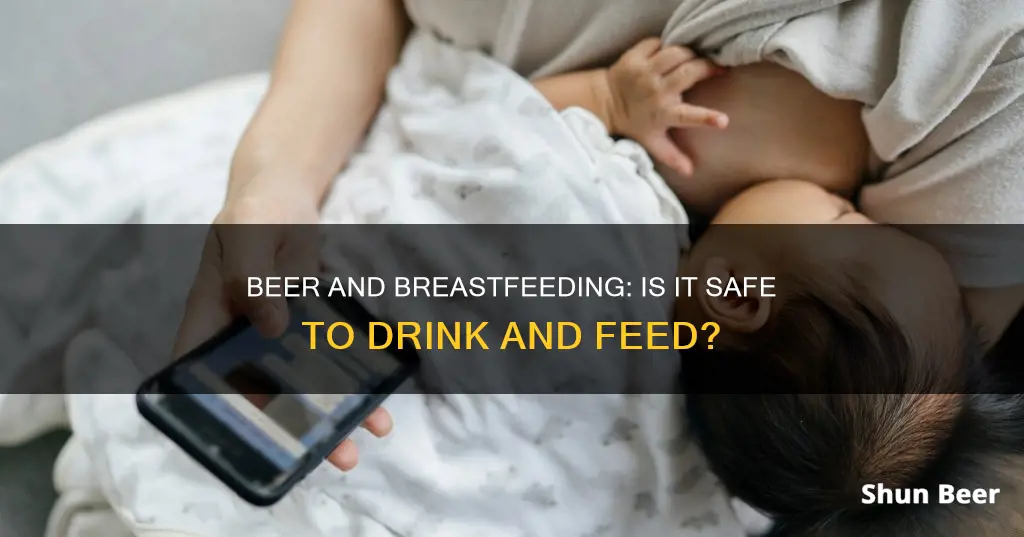
Drinking beer is often believed to increase breast milk supply, but does it really? While it is considered safe to have an occasional drink, drinking beer while breastfeeding may not be a good idea. Here's why.
When it comes to breastfeeding, there are a lot of questions and concerns, especially when it comes to alcohol consumption. Many new mothers wonder if they can ever enjoy a cold beer again without affecting their baby's health and development. While it is true that alcohol passes into breast milk, and excessive consumption can impact a baby's sleep and growth, the effects of moderate drinking are less clear.
Some sources suggest that drinking in moderation, such as having one standard glass of alcohol, is likely fine. However, it is important to note that drinking heavily while breastfeeding can have consequences for the baby. Additionally, alcohol can affect the balance of hormones that control breast milk production and reduce supply. It also hinders the milk ejection reflex, resulting in the baby getting less milk.
So, while an occasional drink is unlikely to cause harm, regular and heavy drinking may affect milk supply and the baby's growth and development. Planning ahead, such as expressing and storing milk beforehand, can help minimise the amount of alcohol that reaches the baby. Remember, small amounts of alcohol can be found in breast milk, and as the body metabolises it, the amount in the milk decreases.
| Characteristics | Values |
|---|---|
| Alcohol in breast milk | Yes, alcohol passes into breast milk. |
| Alcohol and breastfeeding safety | Occasional light drinking while breastfeeding has not been shown to have adverse effects on babies. |
| Alcohol and milk supply | Alcohol can affect the balance of hormones that control breast milk production and can reduce supply. |
| Pumping and dumping | Pumping and dumping does not remove alcohol from breast milk. |
| Timing of breastfeeding after drinking alcohol | It takes around 2 hours for the average adult to metabolize one drink. |
| Alcohol and baby development | Alcohol can cause developmental and neurological problems in babies. |
What You'll Learn

Alcohol passes into breast milk
The amount of alcohol in breast milk is influenced by several factors, including how quickly the alcohol is consumed, whether it is consumed with food, the mother's weight, and individual variations in alcohol absorption and metabolism.
Exposing an infant to alcohol through breast milk could be harmful. Studies have shown that infants who were breastfed by mothers who had consumed alcohol prior to nursing consumed about 20% less milk in the first 4 hours after maternal alcohol consumption compared to infants of mothers who did not drink. Alcohol can also interfere with the milk ejection reflex, leading to decreased milk production over time. Additionally, alcohol consumption while breastfeeding could negatively affect the infant's development, growth, and sleep patterns.
To minimise the amount of alcohol in breast milk, mothers can wait at least 2 hours after consuming a single drink before breastfeeding. If the mother needs to feed the infant before this time has passed, she can use previously expressed milk. It is important to note that expressing or pumping milk after consuming alcohol will not reduce the amount of alcohol in the mother's milk more quickly.
Beer and Macros: Can You Drink and Stay on Track?
You may want to see also

Drinking beer may lower breast milk supply
Drinking beer while breastfeeding is generally considered safe in moderation, but it's important to understand the potential impact on breast milk supply and other related factors. Here are some key points to consider:
Impact on Milk Ejection and Supply
Beer contains alcohol, which can inhibit the milk ejection reflex and reduce the amount of milk available to the nursing infant. Alcohol is a potent inhibitor of oxytocin, a hormone that stimulates milk ejection. As a result, drinking beer or other alcoholic beverages before nursing may lead to a decrease in the amount of milk the baby receives.
Research Findings
Several studies have found that infants breastfed by mothers who consumed alcohol prior to nursing consumed approximately 20% less milk during the first 3 to 4 hours. This reduction in milk intake is likely due to the inhibitory effect of alcohol on the milk ejection reflex rather than changes in the taste of the milk.
Alcohol's Effect on Hormones
In addition to inhibiting oxytocin, alcohol also affects another important hormone, prolactin, which stimulates breast milk production. While alcohol can increase prolactin levels, it simultaneously decreases oxytocin levels, resulting in a delay in milk ejection. This combination of effects leads to a significant delay in milk ejection and a potential reduction in overall milk supply.
Regular Consumption
Regular and heavy consumption of alcohol can have a more pronounced negative effect on breast milk supply and the let-down reflex. Individuals who drink regularly tend to have lower milk supplies compared to those who abstain from alcohol. The let-down reflex is also delayed in regular drinkers, which can result in the baby receiving less milk.
Recommendations
If you choose to consume beer or other alcoholic beverages while breastfeeding, it is important to drink in moderation and allow sufficient time for the alcohol to clear from your system before nursing. The general guideline is to wait for at least 2 hours after consuming one drink before breastfeeding. If you consume more than one drink, the waiting time increases accordingly. It is also recommended to avoid drinking alcohol until your baby is at least 3 months old.
Vodka and Beer: Mixing Alcohol Safely and Responsibly
You may want to see also

Drinking beer may affect the baby's sleep
Drinking beer while breastfeeding may affect the baby's sleep. Alcohol passes into the breast milk, and the levels of alcohol in the milk are similar to those in the mother's blood. The highest levels of alcohol in the milk are typically found 30 to 60 minutes after drinking.
Research has shown that infants who were breastfed by mothers who had consumed alcohol slept less overall in the first 24 hours after maternal alcohol consumption. Their sleep was more fragmented, and they experienced an increase in REM sleep. They also had more frequent wakefulness and less total active sleep.
In addition, the effects of alcohol on the mother's body can also impact the baby's sleep. Alcohol can cause a delay in the milk ejection reflex, resulting in decreased milk production and intake by the baby. This can lead to a hungry or frustrated baby who may have difficulty sleeping.
Furthermore, there is a potential long-term impact on the baby's development, including possible adverse effects on the baby's neurodevelopment.
Therefore, it is generally recommended to avoid drinking beer or any alcoholic beverage while breastfeeding. If a mother chooses to drink, it is advised to limit consumption to one standard drink and to wait at least two hours after drinking before breastfeeding or pumping.
The Magic Behind Beer Glycol Systems: Keeping Beer Cold
You may want to see also

Drinking beer may affect the baby's growth and development
Drinking beer while breastfeeding may affect the baby's growth and development in several ways. Firstly, alcohol can interfere with the mother's milk production and ejection reflex, resulting in decreased milk supply and intake for the baby. This can lead to reduced weight gain and growth in the infant. Secondly, alcohol in breast milk can impact the baby's sleep patterns, causing increased sleepiness but shorter sleep duration. Thirdly, there may be long-term implications for the baby's development, including potential delays in motor and cognitive development. Additionally, regular exposure to alcohol in breast milk may lead to developmental and neurological problems in the baby. It is important to note that the effects of alcohol on the baby depend on the amount consumed, and occasional light drinking while breastfeeding has not been shown to have adverse effects. However, regular or heavy drinking while breastfeeding is not advised.
Famvir and Beer: Is It Safe to Drink?
You may want to see also

Drinking beer may affect the taste of breast milk
While it is not proven that drinking beer increases milk supply, it is a fact that alcohol passes into breast milk and can affect its taste.
According to a study, babies consumed 20% less breast milk during the first four hours after their mothers consumed alcohol compared to when they did not. However, the reason for this decrease in milk intake is not necessarily because of a change in the taste of the milk. It could be due to a decrease in supply or a pharmacological effect of alcohol on the infant or the mother.
The barley in beer can boost prolactin production, which stimulates breast milk production. However, the alcohol in beer decreases milk production and inhibits the milk ejection reflex, resulting in less milk being available to the nursing infant.
It is recommended that breastfeeding mothers wait at least two hours after drinking a 12-ounce beer before breastfeeding. If more than one beer is consumed, it is advisable to wait an additional two hours for each additional drink.
Beer and Intermittent Fasting: What You Need to Know
You may want to see also
Frequently asked questions
Drinking beer or any other alcoholic drink will not help with breastfeeding. In fact, it may reduce your milk supply.
It is recommended that you wait for at least 2 hours after drinking one 12-ounce beer before breastfeeding. If you drink more than one beer, wait for 2 additional hours for each additional drink.
According to the Centers for Disease Control and Prevention (CDC), it is safest for breastfeeding mothers to avoid consuming alcohol altogether. However, occasional light drinking (up to one standard drink per day) while breastfeeding has not been shown to have adverse effects on babies.
Drinking alcohol while breastfeeding can affect the balance of hormones that control breast milk production (prolactin and oxytocin) and reduce your supply. It can also hinder the milk ejection reflex and milk production, especially when consumed in large amounts. Additionally, alcohol can change the taste and smell of breast milk, which may cause the baby to be reluctant to feed.
If you are looking for a drink that may help with milk supply, alcohol-free beer or malt drinks are options. These drinks provide the galactagogue (milk supply-enhancing) benefits of barley without the negative effects of alcohol.







